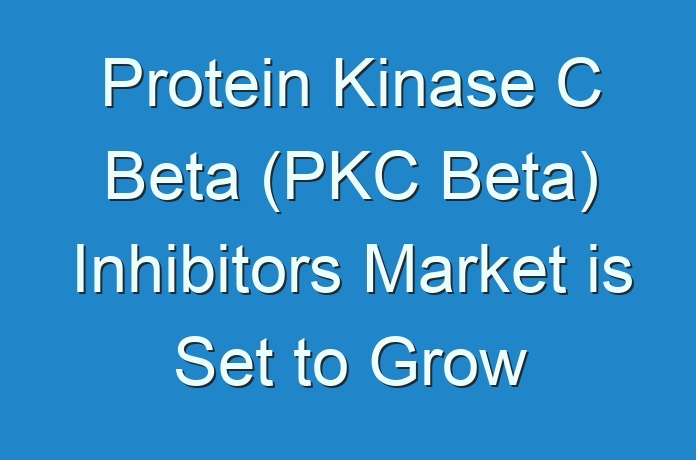
The global market for protein kinase c beta (PKC-Beta) Inhibitors is increasing significantly. This increase in the market is majorly due to high efficacy of treatment for diabetes, cardiac disorder, cancer, and others has increased the scope for protein kinase c beta inhibitors. The advantage of long acting, specific and effective treatment of the diseases has increased the preference for protein kinase c beta inhibitors market.
Read Report Overview – https://www.transparencymarketresearch.com/protein-kinase-c-beta-inhibitors-market.html
The protein kinase c beta molecules are serine/threonine protein kinases, that perform a significant function in numerous cellular functions such as gene expression, hormone secretion, and cell growth and differentiation. The protein kinase – C (PKC) molecules are integrated into several important signal transduction pathways stimulated by a wide range of growth factors like GPCRs. These PKC enzyme are calcium and lipid sensitive.
The phospholipase C enzymes hydrolyze phosphatidylinositol 4, 5-bisphosphate (PIP2) to produce membrane bound Di-acyl glycerol (DAG), which in turn activates inositol trisphosphate (IP3) and protein kinase c (PKC), which leads to mobilization of intracellular calcium. Protein kinase c (PKC) is expressed in most of the tissues and various protein kinase c (PKC) sub-families are expressed in the single cell.
Request Brochure of Report – https://www.transparencymarketresearch.com/sample/sample.php?flag=B&rep_id=14087
The protein kinase c (PKC) beta inhibitors are available in two conventional isoforms, PKC-beta I and PKC-beta II with C1 domain. PKCβ1 (PRKCB) situated on chromosome 16p11.2. It comprises 17 exons. The PKCβ1 isoform is comparatively short amongst the two isoforms. It included two alternatively spliced mRNAs and it results from use of an alternating splice site at the 5′-end of the terminal exon. Both the PKCβ1 and PKCβ2 isoform has different C-terminus.
It includes 671 amino acid proteins and is involved in B cell activation, endothelial cell proliferation, and endothelial cell proliferation. It also includes intestinal carbohydrate absorption, immediate stress. The protein kinase c PKCβ2/ PRKCB are situated on chromosome 16p11.2 which is composed of 17 exons, 673 amino acid proteins and with two alternatively spliced mRNAs. The PKCβ2 isoform is comparatively the longer isoform.
The Protein Kinase C Beta (PKC-Beta) Inhibitors market can be segmented into by therapy, by route of administration, by drug class and by geography. In the terms of therapy, the Protein Kinase C Beta (PKC-Beta) Inhibitors is classified into monotherapy and combination therapy. The combination therapy offers a wide therapeutic range, thus the segment is showing high acceptance. Several protein kinase C beta (PKC-Beta) inhibitors are still in drug pipeline. However, few drugs in phase 3 clinical trials has shown a promising results against the diabetes indication.
Request for Custom Research – https://www.transparencymarketresearch.com/sample/sample.php?flag=CR&rep_id=14087
Based on specificity and selectivity of drug action, the protein kinase C beta (PKC-Beta) inhibitors are classified. According to drug class, protein kinase C beta (PKC-Beta) inhibitors can be classified as Phorbol esters, Indolocarbazole, Macrocyclic lactones, Nonsteroidal anti-oestrogen and others.
Based on the route of administration, several protein kinase C beta (PKC-Beta) inhibitors market is classified into intravenous, oral and others. Due to high safety, oral administration has been the preferred choice of option for the patient.
Geographically, North America occupies the largest market share followed by other developed region like Europe. United States have been the major market across the world. High and advanced drug research and development activities has boosted the North America market for protein kinase C beta (PKC-Beta) inhibitors.
Pre Book Protein Kinase C Beta (PKC-Beta) Inhibitors Market Report at https://www.transparencymarketresearch.com/checkout.php?rep_id=14087<ype=S
Moreover, Asia Pacific protein kinase C beta (PKC-Beta) inhibitors market is expected to have a significant growth due to factors such as rising population, and increasing disposable income. Due to these factors, the Asia Pacific market is observing high number of new entrants compared to those in developed regions.
The major players having presence in the global market include Boehringer Ingelheim, Eli Lilly., Novartis, Takeda Pharmaceutical Company Limited, Novartis AG, Keryx Biopharmaceuticals, Pfizer, Inc., Amgen Inc. amongst others.
About Us
Transparency Market Research is a global market intelligence company providing global business information reports and services. Our exclusive blend of quantitative forecasting and trends analysis provides forward-looking insight for several decision makers. Our experienced team of analysts, researchers, and consultants use proprietary data sources and various tools and techniques to gather and analyze information.
Our data repository is continuously updated and revised by a team of research experts so that it always reflects latest trends and information. With a broad research and analysis capability, Transparency Market Research employs rigorous primary and secondary research techniques in developing distinctive data sets and research material for business reports.
Contact
Transparency Market Research,
90 State Street, Suite 700,
Albany, NY 12207
Tel: +1-518-618-1030
USA – Canada Toll Free: 866-552-3453
Website: https://www.transparencymarketresearch.com/





